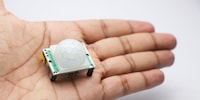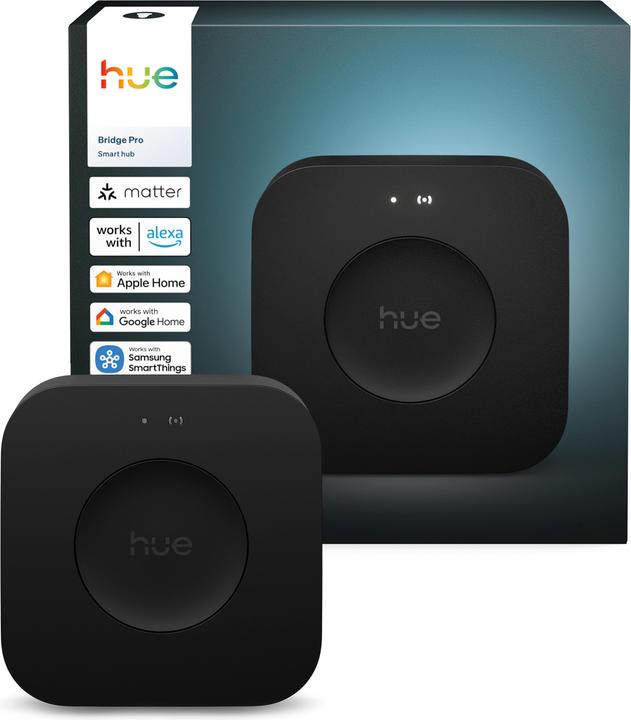
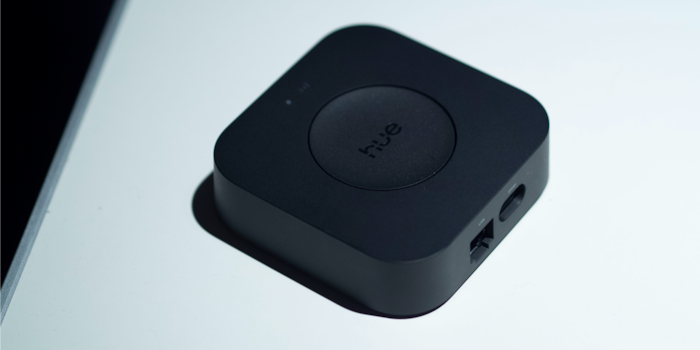
The Bridge Pro lets your Hue lights recognise intruders
After the leak a fortnight ago, it is now finally clear that after ten years, Hue is expanding its range with a bridge that is equipped with great features.
In mid-August of this year, our colleague Debora Pape reported on the self-inflicted leak from Hue, which revealed that the manufacturer has the more powerful bridge in the starting blocks. Whether this was just a skilfully crafted PR stunt or an unfortunate oversight probably remains a mystery. But one thing is clear: the Bridge Pro was presented at the IFA tech fair in Berlin and is now officially here. And it comes with a feature that turns Hue lights into a burglar alarm system.

A new bridge generation arrives after ten years
After the Bridge V2 was released in 2015, the central control unit required to control Hue devices in a coordinated manner went quiet. Taken a Byte, smart lighting fans had to make do with 50 to 60 supported devices per bridge.
Ten years later, the new bridge generation can finally do much more: it controls 150 light points and operates up to 50 accessories such as switches and sensors. It can store up to 500 scenes and will soon be able to control two simultaneous entertainment streams. By the end of the year, 20 instead of 10 lamps will also be synchronised with music in entertainment mode. However, these additions will have to suffice, because unlike the previous version, the manufacturer has not yet provided multi-bridge support. The Pro version is available for around 90 francs.

What hasn't changed, however, is control via the ZigBee protocol and compatibility with ZigBee lamps from some third-party providers.
Lamps as motion sensors and burglar alarm system
The information on the second assumption reported by the self-proclaimed Ent-hue-siast Debora Pape is also confirmed: Hue turns the smart lights into motion sensors. The company calls the function MotionAware.
According to the press spokesperson, the prerequisites for MotionAware are already built into most Zigbee lights anyway. It therefore made sense to use them to bridge the gap between smart lights and security systems. More everyday use cases are lights that switch on when people walk past or recognise when a person is in the room without direct visual contact.
To do this, at least three lamps must be distributed around the room to create a zone profile. The lamps then continuously send data to the Bridge Pro. If it detects anomalies in the interference of the radio signals, it infers that someone is in the zone. This can be set as a trigger for automation in the app. For example, to trigger an alarm: In addition to a notification to the smartphone, it can set a bright light colour in the area, for example.
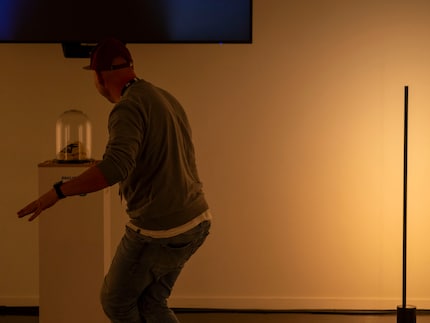
MotionAware can be used on new lamps as well as on around 95 per cent of all older ZigBee lamps. Unfortunately, MotionAware will only be available with the new Bridge Pro. The older Bridge generations will be left empty-handed. The company also mentions that the motion data is only stored locally.
WLAN integration
An integrated Wi-Fi chip has been added to the Bridge Pro. This means that it can be integrated into the network not only via Ethernet as before, but also via WLAN. This simplifies the placement of the Bridge in many cases. Connection via the Ethernet port is still possible, although power supply via Ethernet is not planned. Instead, the company relies on USB-C for the power supply.
Migration from Bridge V2 to Pro
Users who have spent a lot of time personalising their systems with the previous model can now transfer these settings to the new Bridge Pro under the guidance of the app. This works both with a single Bridge and with two Bridges that are merged into the new Pro. This is planned for the latter at least until the end of the year.
In both cases, personalisations for lights, switches and sensors will be transferred, as well as rooms, zones and scenes. The automation and entertainment settings can initially only be transferred from a single Bridge V2 to the Bridge Pro.
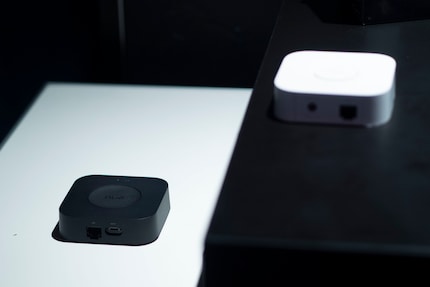
The obligatory AI feature
Of course, Hue is also relying on AI for its products this year. Various suggestions for lighting scenes can be generated via the app using text or voice input. This should reduce the effort required to create new scenes.
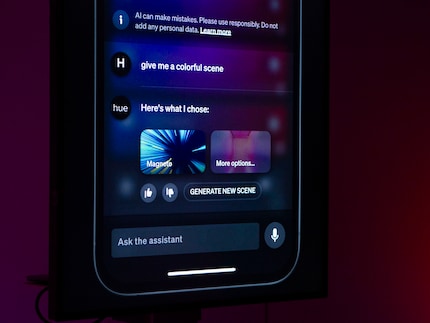
Supplementary note (08/09/2025): The new Bridge Pro is now linked at the top of the article. The current availability is not ideal. The rush was much greater than we expected. That's why it will take a while until there are supplies again.
Painting the walls just before handing over the flat? Making your own kimchi? Soldering a broken raclette oven? There's nothing you can't do yourself. Well, perhaps sometimes, but I'll definitely give it a try.
From the latest iPhone to the return of 80s fashion. The editorial team will help you make sense of it all.
Show all